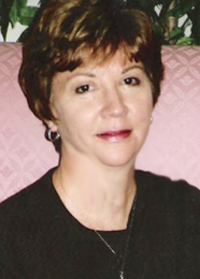VHI — "Giving hope for a longer, happier life."
Debra May
"The battle with papilloma has been a long one for me and many others. Dr. Zeitels is fighting the battle with us. We are fully able to receive the treatment that is less invasive and has a faster recovery rate so we may have more quality time with our families.
The treatment helps to eliminate the fears that the operating room has for a patient who cannot snap back as quickly as they once did.
What Dr. Zeitels has given me is hope for a longer and happier life, for which I will always be grateful. My wish is that many doctors will come and join this battle so that everyone who has this disease might benefit."
Debra May's speaking voice is low and a little raspy. An elegant woman with a soft southern accent, she credits new office-based surgical procedures with saving her life. When Debra was just a baby, her voice became increasingly weak. Concerned parents took her to a doctor who found Debra's declining voice was due to wartlike tumors, growing in size and number throughout her larynx, and obstructing her airway. Debra was diagnosed with juvenile papilloma, a disease caused by human papilloma virus (HPV).
At age three, the tumors were so widespread that doctors were concerned Debra's disease was life threatening. Surgeons cut an opening in her windpipe and inserted a metal tube into the opening (tracheotomy) bypassing tumors to allow air to get to her lungs. From then on, Debra's voice was a whisper, and she breathed through a tube in her throat. Debra's parents tried to give her as normal a childhood as possible, but there were challenges. Until technology produced an improved tracheostomy tube, Debra's mother had to remove and sterilize the metal tube daily. "This was difficult for both of us. My mother was not a nurse, but she was strong and got through it," remembers Debra.
Other children were confused by her uncommon disability, and she was limited physically. "I loved ballet lessons but others were uncomfortable with me dancing. I'm not sure if it was my general health, or the tracheotomy, but they made me stop." And, the tumors were still growing, Debra underwent dozens of surgeries to remove them. "I wouldn't want any child to suffer the way I did," she says, "but I am grateful to my parents for all they did to help me." Medical advancements allowed doctors to remove Debra's tracheostomy tube when she was 16. "I had a voice for the first time that I could remember. Though it was not a pretty voice, I was elated to have it.
Even if I wasn't healed, at least the last couple years of high school were more normal for me. I looked like other kids, and I could actually talk." Debra also needed fewer surgeries, and over the next 17 years she led a nearly normal life, fell in love, and married Jonathan May. The couple wanted to start a family, but limited information was available to them about the risks of bearing children. She got pregnant, and Debra's tumors began to multiply at a dramatic and terrifying pace. "It was very scary. I couldn't lay flat and still breathe so I had to sleep in a chair. We were concerned about our baby and its oxygen levels, but I couldn't have surgery because of the danger of going under anesthesia. It was a terrible time." Debra and Jonathan finally welcomed a daughter, Ashley, but paid a hefty toll for their baby. Debra's disease, manageable for decades, flared up to an alarming level.
She lost track of the exact number, but estimates she underwent 70+ surgeries. The disease also prevented Debra and Jonathan from attempting to have another child. The risks to Debra's health were too high, and "It was more important that Ashley have a mother, than brothers or sisters," she explains. The family had another pressing concern—Debra's health and spirit were weakening as she went under anesthesia every few weeks. "The number of procedures took a toll on me. I had pneumonia a couple of times, was exhausted, and couldn't catch my breath. It was scary. I didn't think Ashley would have a mother for much longer." Then, Debra read an article about Dr. Steven Zeitels and his success with new office-based laser surgery offered at the Massachusetts General Hospital in Boston. "I thought the procedures, which could be done without anesthesia, were too good to be true. I made an appointment immediately." The procedure removed the tumors in just a few minutes using a numbing gel to prevent pain.
Today, Debra and Jonathan regularly travel 400 miles to Boston for office-based surgeries. "I am just so grateful these procedures exist. I don't think that I'd be here if they didn't. For me and my family, it's a miracle."
— DEBRA MAY




